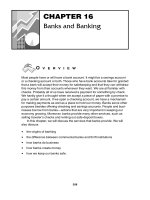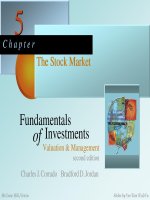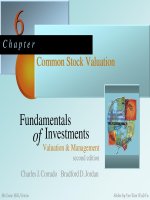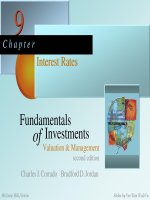Slides_Fundamentals of Investments - Chapter 16 pot
Bạn đang xem bản rút gọn của tài liệu. Xem và tải ngay bản đầy đủ của tài liệu tại đây (1.01 MB, 37 trang )
16
16
C h a p t e r
Futures ContractsFutures Contracts
second edition
Fundamentals
of
Investments
Valuation & Management
Charles
J.
Corrado Bradford
D.Jordan
McGraw Hill / Irwin Slides by Yee-Tien
(Ted) Fu
© 2002 by The McGraw-Hill Companies, Inc. All rights reserved.
McGraw Hill / Irwin
16 - 2
Futures Contracts
Our goal in this chapter is to discuss
the basics of futures contracts and
how their prices are quoted in the
financial press. We will also look at
how futures contracts are used and
the relationship between current cash
prices and futures prices.
Goal
© 2002 by The McGraw-Hill Companies, Inc. All rights reserved.
McGraw Hill / Irwin
16 - 3
Futures Contracts Basics
Forward contract
Agreement between a buyer and a seller,
who both commit to a transaction at a future
date at a price set by negotiation today.
Futures contract
Contract between a seller and a buyer
specifying a commodity or financial
instrument to be delivered and paid for at
contract maturity. The specified price is
called the futures price.
© 2002 by The McGraw-Hill Companies, Inc. All rights reserved.
McGraw Hill / Irwin
16 - 4
Futures Contracts Basics
While a forward contract can be struck
between any two parties, futures contracts are
managed through an organized futures
exchange.
© 2002 by The McGraw-Hill Companies, Inc. All rights reserved.
McGraw Hill / Irwin
16 - 5
Futures Contracts Basics
Established in 1848, the Chicago Board of
Trade (CBOT) is the oldest organized futures
exchange in the United States.
It grew with the westward expansion of
American ranching and agriculture, and is
today, the largest, most active futures
exchange in the world.
In the 1970s, financial futures were introduced.
They are so successful that they now constitute
the bulk of all futures trading.
© 2002 by The McGraw-Hill Companies, Inc. All rights reserved.
McGraw Hill / Irwin
16 - 6
Futures Contracts Basics
In general, futures contracts must stipulate at
least the following five terms:
c The identity of the underlying commodity or financial
instrument.
d The futures contract size.
e The futures maturity date, also called the expiration
date.
f The delivery or settlement procedure.
g The futures price.
Futures Contracts Basics
16 -
7
Futures Contracts Basics
16 -
8
© 2002 by The McGraw-Hill Companies, Inc. All rights reserved.
McGraw Hill / Irwin
16 - 9
Work the Web
Visit the websites of these futures
exchanges:
© 2002 by The McGraw-Hill Companies, Inc. All rights reserved.
McGraw Hill / Irwin
16 - 10
Work the Web
For futures prices and price charts,
visit:
© 2002 by The McGraw-Hill Companies, Inc. All rights reserved.
McGraw Hill / Irwin
16 - 11
Why Futures?
A futures contract represents a zero-sum game
between a buyer and a seller.
Î Any gain realized by the buyer is exactly equal to
the loss realized by the seller, and vice versa.
Futures contracts can be used for speculation
or for hedging. Hedgers transfer price risk to
speculators, while speculators absorb price
risk.
Î Hedging and speculating are complementary
activities.
© 2002 by The McGraw-Hill Companies, Inc. All rights reserved.
McGraw Hill / Irwin
16 - 12
Speculating with Futures
Buying futures is often referred to as “going
long,” or establishing a long position. A long
position profits from a futures price increase.
Selling futures is often called “going short,” or
establishing a short position. A short position
profits from a futures price decrease.
A speculator accepts price risk by going long
or short to bet on the future direction of prices.
© 2002 by The McGraw-Hill Companies, Inc. All rights reserved.
McGraw Hill / Irwin
16 - 13
Hedging with Futures
A hedger is a trader who seeks to transfer price
risk by taking a futures position opposite to an
existing position in the underlying commodity
or financial instrument.
Suppose a large operating inventory is needed.
The sale of futures to offset potential losses
from falling prices is called a short hedge.
When some commodity is needed in the future,
the purchase of futures to offset potential
losses from rising prices is called a long hedge.
© 2002 by The McGraw-Hill Companies, Inc. All rights reserved.
McGraw Hill / Irwin
16 - 14
Work the Web
To learn more about futures, visit:
© 2002 by The McGraw-Hill Companies, Inc. All rights reserved.
McGraw Hill / Irwin
16 - 15
Futures Trading Accounts
A futures exchange, like a stock exchange,
allows only exchange members to trade on the
exchange.
Exchange members may be firms or
individuals trading for their own accounts, or
they may be brokerage firms handling trades
for customers.
© 2002 by The McGraw-Hill Companies, Inc. All rights reserved.
McGraw Hill / Irwin
16 - 16
Futures Trading Accounts
There are several essential things to know
about futures trading accounts.
c Margin is required - initial margin as well as
maintenance margin.
d The contract values are marked to market on a
daily basis, and a margin call will be issued if
necessary.
e A futures position can be closed out at any
time. This is done by entering a reverse trade.
© 2002 by The McGraw-Hill Companies, Inc. All rights reserved.
McGraw Hill / Irwin
16 - 17
Work the Web
For a list of online futures brokers,
visit the Commodities & Futures
section of Investor Links at:
© 2002 by The McGraw-Hill Companies, Inc. All rights reserved.
McGraw Hill / Irwin
16 - 18
Cash Prices
Cash price (or spot price)
The price of a commodity or financial
instrument for current delivery.
Cash market (or spot market)
The market in which commodities or
financial instruments are traded for
essentially immediate delivery.
Cash Prices
16 -
19
Cash Prices
16 -
20
© 2002 by The McGraw-Hill Companies, Inc. All rights reserved.
McGraw Hill / Irwin
16 - 21
Cash-Futures Arbitrage
Earning risk-free profits from an unusual
difference between cash and futures prices is
called cash-futures arbitrage.
Î In a competitive market, cash-futures arbitrage has
very slim profit margins.
Cash prices and futures prices are seldom
equal. The difference between the cash price
and the futures price for a commodity is
known as basis.
basis = cash price –
futures price
© 2002 by The McGraw-Hill Companies, Inc. All rights reserved.
McGraw Hill / Irwin
16 - 22
Cash-Futures Arbitrage
For commodities with storage costs, the cash
price is usually less than the futures price, i.e.
basis < 0. This is referred to as a carrying-
charge market.
Sometimes, the cash price is greater than the
futures price, i.e. basis > 0. This is referred to
as an inverted market.
Basis is kept at an economically appropriate
level by arbitrage.
© 2002 by The McGraw-Hill Companies, Inc. All rights reserved.
McGraw Hill / Irwin
16 - 23
Spot-Futures Parity
The relationship between spot prices and
futures prices that holds in the absence of
arbitrage opportunities is known as the spot-
futures parity condition.
Let F be the futures price, and S be the spot
price. If r is the risk-free rate per period, and
the futures contract matures in T periods, then
the spot-futures parity condition is:
(
)
T
T
rSF += 1
© 2002 by The McGraw-Hill Companies, Inc. All rights reserved.
McGraw Hill / Irwin
16 - 24
More on Spot-Futures Parity
Let D be the dividend (or coupon payment)
paid in one period, at or near the end of the
futures contract’s life. Then, the spot-futures
parity condition becomes F = S(1 + r) – D.
Alternatively, we can write the dividend-
adjusted parity result as F = S(1 + r – d),
where dividend yield d = D/S. Then
(
)
T
T
drSF −+= 1
© 2002 by The McGraw-Hill Companies, Inc. All rights reserved.
McGraw Hill / Irwin
16 - 25
Stock Index Futures
There are a number of futures contracts on
stock market indexes. The S&P 500 contract is
one of the most important ones.
Because of the difficulty of actual delivery,
stock index futures are usually settled in cash.









